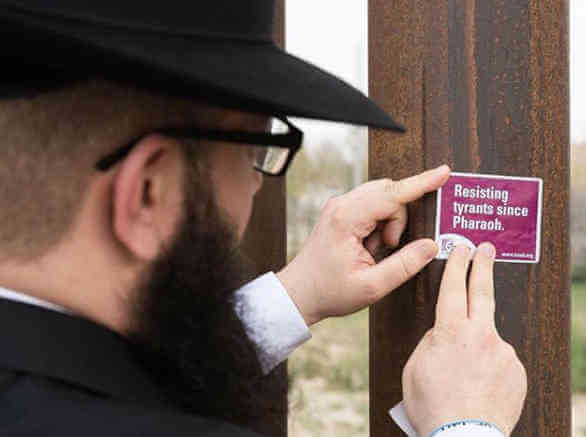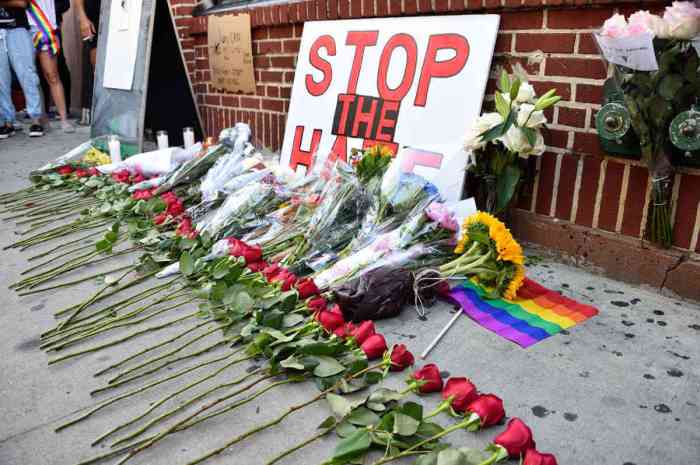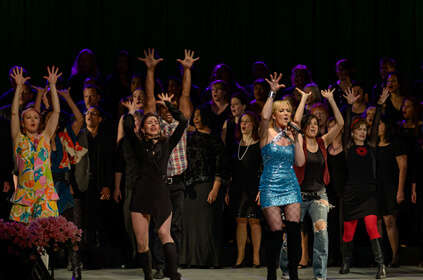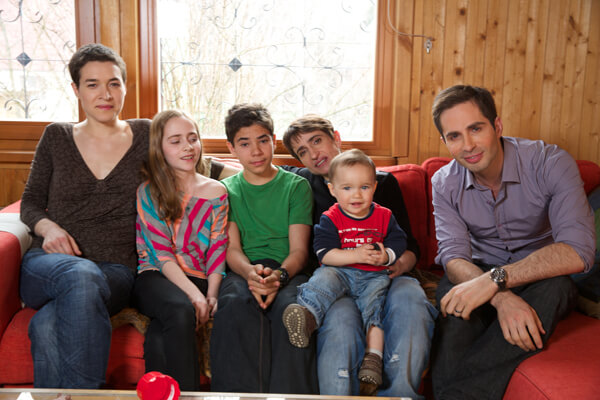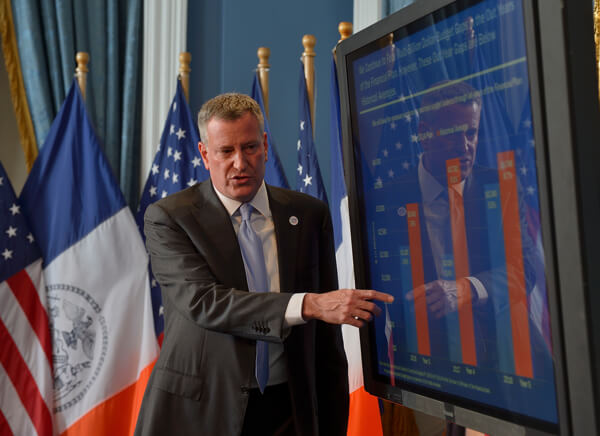[Two weeks ago, Rabbi Yael Rapport and Rabbi Mike Moskowitz from Congregation Beit Simchat Torah, New York City’s LGBTQ synagogue, joined a delegation from the American Jewish refugee assistance nonprofit HIAS and clergy from T’ruah, an organization of rabbis dedicated to defending human rights, to the Southern border, encompassing Texas, New Mexico, and Mexico itself. The delegation bore witness to the humanitarian crises taking place there, deepened their knowledge and sharpened their analysis of the issues at play, and strategized a Jewish response.]
During the seder there is a universal custom to recount the 10 plagues while spilling out a drop of wine for each one.
The first plague is dam, blood. Why is this the first plague? We learn that all of the Egyptians were punished through the Nile turning into blood because Pharaoh decreed that the Hebrew children should be separated from their parents and drowned. The commentators ask, “Why was the entire nation punished if it was only a few people who actually carried out the decree?” Because responsibility falls on the community. As Rabbi Abraham Joshua Heschel writes: “In a free society, few are guilty, all are responsible.”
From those days to this day, we understand as Jews and human beings that we as individuals are not exempt from owning the darkest sins of our community. Whether we participate, whether we are passive, or whether we protest — while we remain accountable, we have the power to determine our response.
It’s been two weeks since we landed in El Paso, beginning our journey to the Southern border, including Texas, New Mexico, and Mexico, with the HIAS and T’ruah clergy delegation.
Just as Moses saw God and didn’t have the proper words, so too do we find ourselves lacking in accurate and emotive descriptions for what we witnessed. While acknowledging that words limit, our feelings were expansive and overwhelming in ways that our retelling can give no justice. Not only at this moment, but also in the moment of walking through the sterile and staged holding cells of Otero Detention Center and Southwest Key Children’s Shelter, we felt hopelessness, impotency, despair — trapped in a performative role of observation and internalization, not action, not change-making.
Otero and Southwest Key are both opportunist, for-profit businesses, incentivized by the exploitation of others. MTC, Management and Training Corporation, a part of the prison industrial complex that operates a US prison on the same site for violent offenders, makes $97 dollars a day per head on each of the more than 1,000 individuals being held at Otero. “Inmates,” as they are called at Otero, work for a dollar a day doing everything from barbering to packing sandbags outdoors in the New Mexico sun. A tapped phone call home, on prison phones, costs 33 cents a minute. Inmates can only speak to lawyers using translation services, which are in-house — meaning tapped. Medical care is available on site, but the one doctor who serves the entire population only works 24 hours a week. A complaint by the American Civil Liberties Union has already been filed against the treatment of LGBTQ individuals being held, who are frequently isolated in solitary confinement “for their own protection” and subject to abuse and harsher working conditions.
To be perfectly clear, seeking asylum in the United States as these “inmates” have done, is NOT and is never a crime.
Over the course of the seder, the four cups of wine that we drink have their scriptural source in the four languages of redemption described in Exodus — the “Arba L’Shonot shel Geula.” God says, “I will redeem you, I will take you out, I will save you, and I will bring you to me.” Part of the liberation of people is the emancipation of language. Passover expands our capacity to elevate the language we use to describe people and circumstances. In fact, the word Pesach — “peh sach” — means “the mouth that speaks.” All of the mitzvoth of the seder, whether eating, storytelling, or asking questions focus on developing this ability. The way in which we talk about things affects the way we see them, and Pesach is our opportunity to see with clarity.
As we moved through different worlds of experience at the Southern border, we heard four languages used to describe those who sought safety and sanctuary in this country. Each description offered a different perspective, not only on the circumstance of the individual but how language affects the way we see people and our response to their struggle.
In Otero, the warden, the ICE official who followed our group, the community representative from Chaparral, New Mexico, and the Detention Center chaplain referred to “inmates” and “detainees.” Reuben Garcia, the director for decades of Annunciation House, an El Paso shelter that houses and places more than 600 individuals and families every day who are released from ICE and Border Patrol custody, called those he serves “refugees” — a political, purposeful statement, as he believes the US holds a moral and legal responsibility under international agreement to afford refugee status to anyone from Central America who is seeking asylum.

At Las Americas, the El Paso Immigration Advocacy Center, lawyers, advocates, and activists called their clients “immigrants” and “asylum seekers.”
We heard new language at the Hope Border Institute and Casa del Migrante — a shelter in Juarez, Mexico, which houses and protects the 10,000 people awaiting processing in the US, including those who had over years built lives, families, and futures here, who had still been deported. The name of the institution and the descriptor for those who reside there is “migrants.” By describing a “person in movement,” such a name can encompass those too who are victims of forced displacement within national boundaries, an all too common event in Central and South America, and calls attention to the larger question of human migration, an ancient reality encompassing violence, global geopolitics, and climate change. “Migrant” stems from the same root as the Spanish “migrantes,” which is the way those at the shelter refer to themselves.
Language can unify and language can divide. The way we describe a person or a circumstance can draw us closer to identifying with them, or can shape them into the other — creating distance and distaste. The night of the seder reminds us of our perpetual communal responsibility to use words to bring people together. That’s what we are doing on Passover; not just going through the motions of a historical retelling, but reliving and relating as if in a first-person experiential narrative. We say “B’chol dor vador,” in every generation it is REQUIRED of us to see ourselves as if we were the ones going forth from Egypt.
How in this generation can words and deeds shift us closer to those telling the same story today — the story of crossing a desert, leaving all we know behind, in search of a promise that brings us out of narrow places? It is their story, it is our story, it is the human story.
What language will you choose to use to describe those affected by immigration and migration today?
Can you join us at Congregation Beit Simchat Torah as our community accompanies those with local ICE deportation hearings, trains ourselves in the legal mechanism of citizenship application, and advocates for policy change in the halls of power and through our calls and cards?
Could you send badly needed supplies to Southern border shelters, such as travel-size toiletries for recently released, or adult and kids underwear in sizes small and medium?
Do you have the ability to financially support CBST in our Sanctuary work, or one of these incredible change-making organizations in Juarez or El Paso through monthly or a one-time gift, perhaps to be collected as tzedakah at your seder table?
If you can take action in any of the ways above, please contact Rabbi Marisa James for more information. Any of these things, all of these things make a massive difference, in our own community and those far away.
Chayavim anu — we are bound, and we are not free until all are free. This Passover, let us add a new chapter to our ancient tale that brings us to today, let us choose around our seder tables the ways we use our gifts, our words, and our power to bring others into a z’man cheiruteinu, a time of liberation.
Rabbi Yael Rapport is assistant rabbi at Congregation Beit Simchat Torah, and Rabbi Mike Moskowitz is the congregation’s Scholar-in-Residence for Trans and Queer Jewish Studies.


